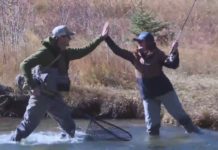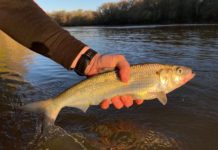[Interview starts at 51:14]
We all get occasional aches and pains from casting, or as we get older we worry about getting them. Dr. Jason Smith is an expert in sports medicine and has worked with many professional athletes in developing routines from strengthening muscles and connective tissue. He has some great advice on avoiding casting injuries, types of therapy to alleviate the pain of these issues, and also some easy exercises to avoid injury in the future. Fly fishing is supposed to be fun, and any way we can take the pain out of it is welcome advice.
In the Fly Box, we have some controversy and some great questions, including:
- If I am fishing an articulated fly in a place where only a single hook is allowed by law, should I cut off the back hook or the front hook?
- I’ve tried night fishing without any success. What do you suggest?
- If I am using a drop-shot rig in very deep, fast water, how many split shot is too many?
- A tip from a listener about a great suggestion for casting he got from George Daniel.
- If I am fishing two or three flies, is there any rule as to where I should place my heaviest fly?
- I only have a 5-weight and a 10-weight rod, and I want to fish for bass. Can I use my 10-weight for bass fishing?
- It’s still hard to reconcile catch-and-release fishing for ecological reasons with a carbon footprint from cross-country trips. And I heard that there is at least an 11% mortality rate in catch-and-release fishing.
- Do trout eat whirligig beetles and water striders? And what do they tell me about a trout stream?
- How should I adjust my fishing tactics when it rains?
- I fish a catch-and-release pond with picky fish and heavy fishing pressure. If no one fished this pond for a year, would the trout get less selective?
- A listener takes me to task for saying I try to avoid fishing for stocked trout. And then asks me what I would do if I lived in an urban area where there were only put-and-take fisheries for trout.
- A listener is confused by the different sizes of aquatic insects and asks if the same ones hatch in different sizes.
- A physicist weighs in on how to stalk trout, knowing how the physics of refraction works.
- A listener gives me a list of the rods he owns and asks if there is something missing in his arsenal, especially for small streams.

Credit: Source link































